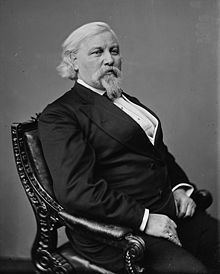
Back مارشال جويل Arabic مارزهال جوئل AZB Marshall Jewell German Marshall Jewell French מרשל ג'וול HE Marshall Jewell Italian マーシャル・ジュウェル Japanese Marshall Jewell Swedish
Marshall Jewell | |
|---|---|
 Photo by Mathew Brady | |
| Chair of the Republican National Committee | |
| In office July 2, 1880 – February 10, 1883 | |
| Preceded by | J. Donald Cameron |
| Succeeded by | Dwight M. Sabin |
| 25th United States Postmaster General | |
| In office August 24, 1874 – July 12, 1876 | |
| President | Ulysses S. Grant |
| Preceded by | James Marshall |
| Succeeded by | James Tyner |
| United States Minister to Russia | |
| In office December 9, 1873 – July 19, 1874 | |
| President | Ulysses S. Grant |
| Preceded by | James Orr |
| Succeeded by | George Boker |
| Governor of Connecticut | |
| In office May 16, 1871 – May 7, 1873 | |
| Lieutenant | Morris Tyler |
| Preceded by | James E. English |
| Succeeded by | Charles Ingersoll |
| In office May 5, 1869 – May 4, 1870 | |
| Lieutenant | Francis Wayland III |
| Preceded by | James E. English |
| Succeeded by | James E. English |
| Personal details | |
| Born | October 20, 1825 Winchester, New Hampshire, U.S. |
| Died | February 10, 1883 (aged 57) New Haven, Connecticut, U.S. |
| Political party | Whig (Before 1854) Republican (1854–1883) |
| Signature | |
Marshall Jewell (October 20, 1825 – February 10, 1883) was a manufacturer, pioneer telegrapher, telephone entrepreneur, world traveler, and political figure who served as 44th and 46th Governor of Connecticut, the US Minister to Russia, the 25th United States Postmaster General, and Republican Party National Chairman. Jewell, distinguished for his fine "china" skin, grey eyes, and white eyebrows, was popularly known as the "Porcelain Man".[1] As Postmaster General, Jewell made reforms and was intent on cleaning up the Postal Service from internal corruption and profiteering. Postmaster Jewell helped Secretary of the Treasury Benjamin H. Bristow shut down and prosecute the Whiskey Ring. President Grant, however, became suspicious of Jewell's loyalty after Jewell fired a Boston postmaster over non payment of a surety bond and asked for his resignation.[1]
A native of New Hampshire, Jewell was the son of a prominent tanner and currier. Having apprenticed in his father's tannery business,[2] Jewell moved to Boston where he learned the art of being a currier. In 1847, Jewell moved to Hartford where he worked for his father's business as a currier. Jewell stopped working as a currier and became a skilled telegrapher, where he worked in New York, Ohio, and Tennessee. Jewell was a Whig who supported the election of Zachary Taylor to the office of the presidency. Having supported Taylor, Jewell moved to Mississippi where he was elected General Superintendent of Telegraphers.[2] Jewell moved back to New York in 1849, and in 1850 he returned to his father's tannery business having entered into partnership with his father. Between 1859 and 1860, Jewell traveled to and visited Europe on business connected with the tannery firm, having returned to the United States during the onset of the American Civil War. In 1865 Jewell returned to Europe and traveled to Egypt and the Holy Land.[2]
Having returned to the United States, Jewell, a Republican, ran for Connecticut state senator in 1867; however, he failed to win the election.[3] In 1868, Jewell ran for the office of Connecticut Governor; however, he lost the election.[3] Jewell ran again the following year and was elected Governor of Connecticut in 1869, serving from 1869 until 1870, and was defeated in the 1870 election. Jewell was reelected to the governorship in 1871 and 1872, and served until 1873. In 1873, Jewell was appointed Consul to Russia by President Ulysses S. Grant and served until 1874 when he was appointed by President Grant as Postmaster General of the United States, a position he held until 1876. Jewell was also a presidential candidate at the 1876 Republican National Convention and served as the chairman of the Republican National Committee from 1880 until 1883. Having returned to Connecticut, Jewell became a wealthy merchant, having invested in the Hartford Evening Post and the Southern New England Telephone Company.[1][3] He died in 1883 in New Haven, Connecticut, and was interred at Cedar Hill Cemetery in Hartford, Connecticut.[4]
- ^ a b c Chicago Daily Tribune (February 18, 1883), Marshall Jewell
- ^ a b c New York Times (July 4, 1874), Appointment and Acceptance of the Hon. Marshall Jewell
- ^ a b c Miller Center (2012), Marshall Jewell (1874–1876): Postmaster General Archived May 8, 2012, at the Wayback Machine, Retrieved May 24, 2012
- ^ "The Political Graveyard: Hartford County, Conn". Cedar Hill Cemetery. Archived from the original on May 14, 2008. Retrieved April 29, 2008.